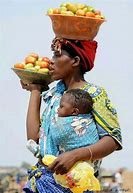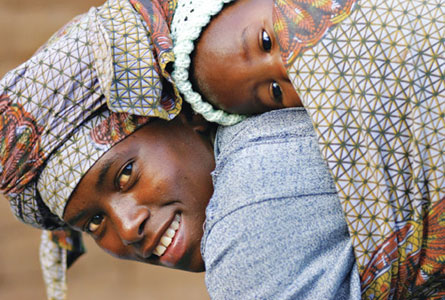During their lifetime, the two brothers were called Dagbayonoh Nyanfore and Dagbayonoh Nimley respectively when referring to their mother (children of the visiting woman) or Jappah Nyanfore and Jappah Nimley when regarding their father, meaning Jappah's son Nyanfore and Jappah's son Nimley.
The Dagbayonoh family is of the Kru tribe, a semi-Bantu people of the Kwa linguistic group. The Kru, called Krao in the Kru language, live in West Africa, particularly in Liberia. They also live in Sierra Leone, Ivory Coast, Ghana, and Nigeria. Ivory Coast and Sierra Leone have a large population of Kru people more than those in Ghana and Nigeria. But in the 20s, 30s, and 50s during socio-political upheavals in Liberia, many Kru settled in Nigeria and Gold Coast now Ghana. Their population reduced greatly specifically in Ghana when the country new prime minister Kofi Busia ordered their return to Liberia in the 1969 Aliens Compliance Order.
The Kru are also seafarers. Because of their adventure and work on ships, many have traveled around the world and have helped build communities outside of Africa. Also according to a report, in the past, they taught Europeans how to navigate the sea.
In the Kru culture, usually the sons take their mother’s name and the daughters take their father’s name. For instance, Penyono Gbe Wolo, Didwho Welleh Twe, and Teah Kunporh Bleh. Wolo is named after his paternal grandmother Penyono Gbe, who was his father’s namesake; Twe was named after his mother Welleh, and Bleh is named after her father Teah Kunpoh. One of the reasons for this is that the daughters would not lose their father’s name when they get married. The son would not forget his mother when he becomes an adult. Also as you observed in the family tree, parents named their children after the parents’ siblings or immediate relatives. This is done to keep the relative’s name alive.
As in most African traditional societies, the mother plays a vital role in the upbringing of the children. In addition to helping the father in administering the family affairs, she nurtures the children and manages the family market and supervises the farm work. The family is the pillar of the village. The family composes of the nuclear family – the mother, father, children, and the extended family, which consists of close and distant relatives. Children are “considered blessings from God. They were born not only unto the parents but also unto the village or community. The village protects them, educates them and helps raise them to adulthood. Children receive their early training and education from the home", as a researcher stated. The grandparents or elders counsel the children and serve as great sources of knowledge.
When a family or clan member dies, each adult member is required to pay a burial contribution. This is a form of burial insurance for the living. Adult members who do not contribute do not get this assistance when they die. It is a taboo, a family embarrassment when this happens. Therefore each member tries to meet this obligation.
Traditionally in the past, three to five days after the burial, the family met for hair cutting ritual, involving a call to the ancestors and appeal to the universal God for his blessing and protection. An elder administered the ritual. The immediate family hairs were shaved to officially begin the mourning of the deceased. The mourning could last six months, during which time the family wore black clothing. At the end of the six months, another celebration was held to remove the black and thus ending the mourning. But in modern days, only an edge of the hairs is shaved, no wearing of black clothing and the mourning time is short, about a week or two.
Tradition says that the spirit of the deceased lives around us during the first six months and leaves us and enters another phase in the external world. Fifty or more years after the burial, the deceased becomes an ancestor. Many traditional Africans share this cultural belief.
An unknown writer wrote that when a king or an official of the village died, the body was buried under a canoe with personal belongings of the deceased. Food items were placed with the belongings. The food was left there with the belief that the newly dead would entertain surrounding spirits, which have not yet departed from the earth.
Culture transcends over education and wealth. Those who lack it are viewed to be lost; and those who have, but do not accept, appreciate, and honor it, are considered to be fools. And there are those who live by it and make it an integral part of their life, whether they are educated, rich, or not. Culture is our base. It sets our direction, and each one of us falls within one of the three groups mentioned. As we stated on our homepage, we hope our children and the unborn generations would know of our culture, people, and history. We will discuss further this culture and history in the following pages.
An African mother selling while holding her child
Traditional African mother
Our Culture & Tradition
GET IN TOUCH WITH US




